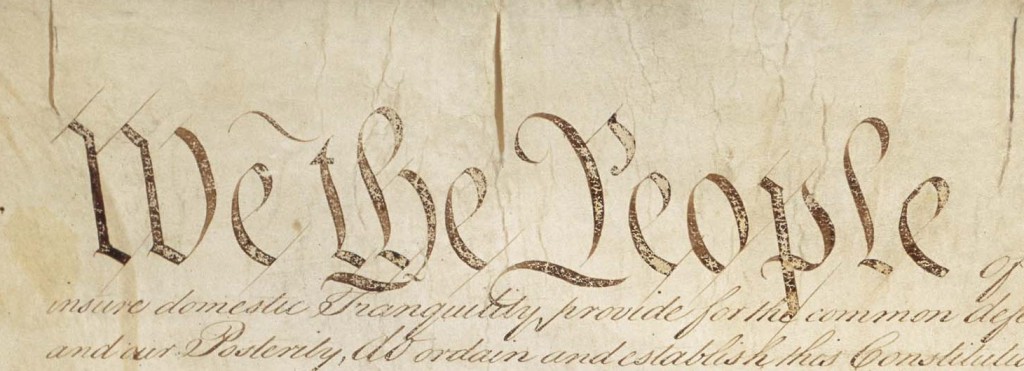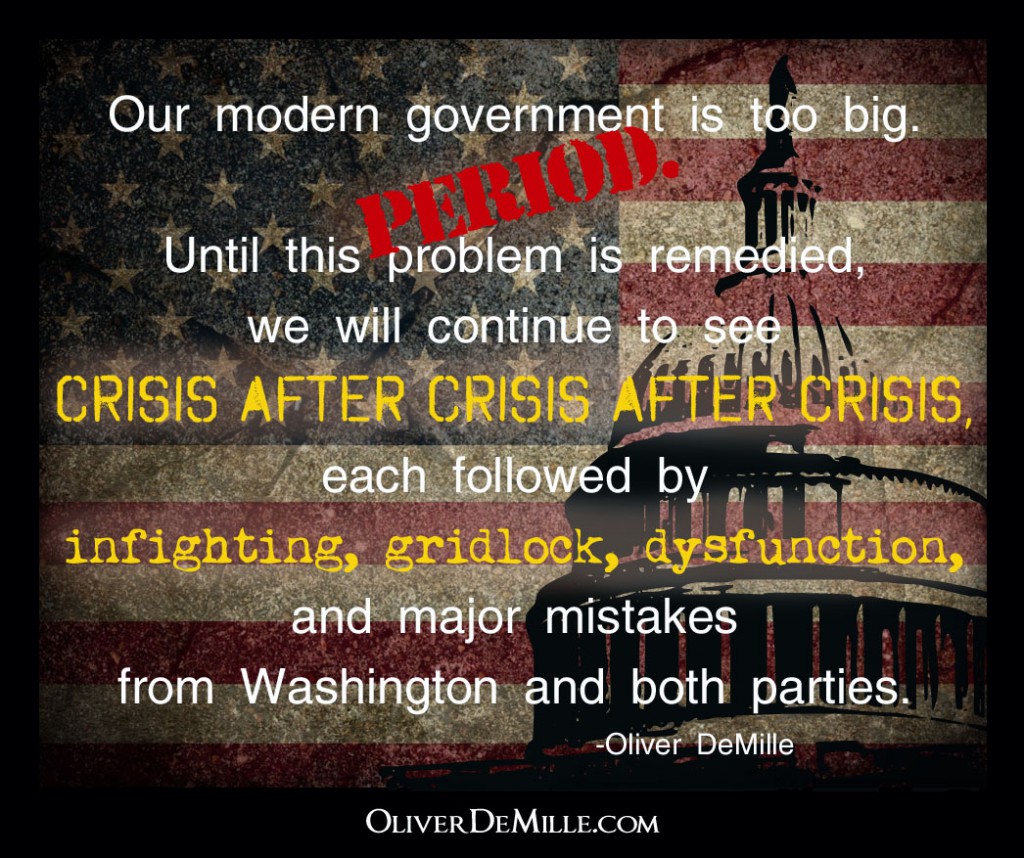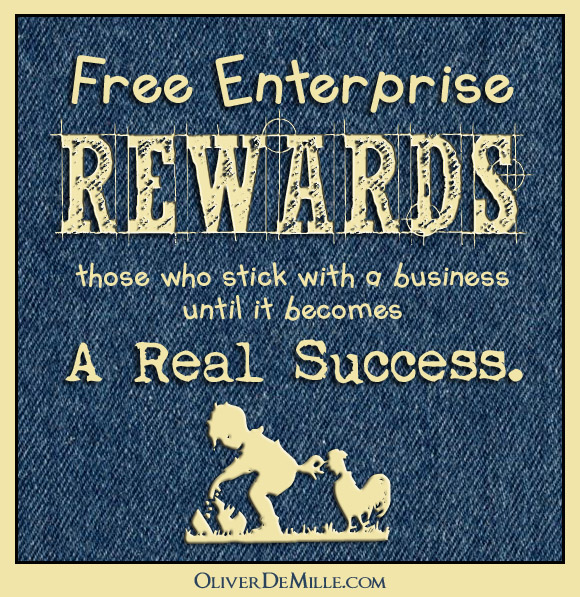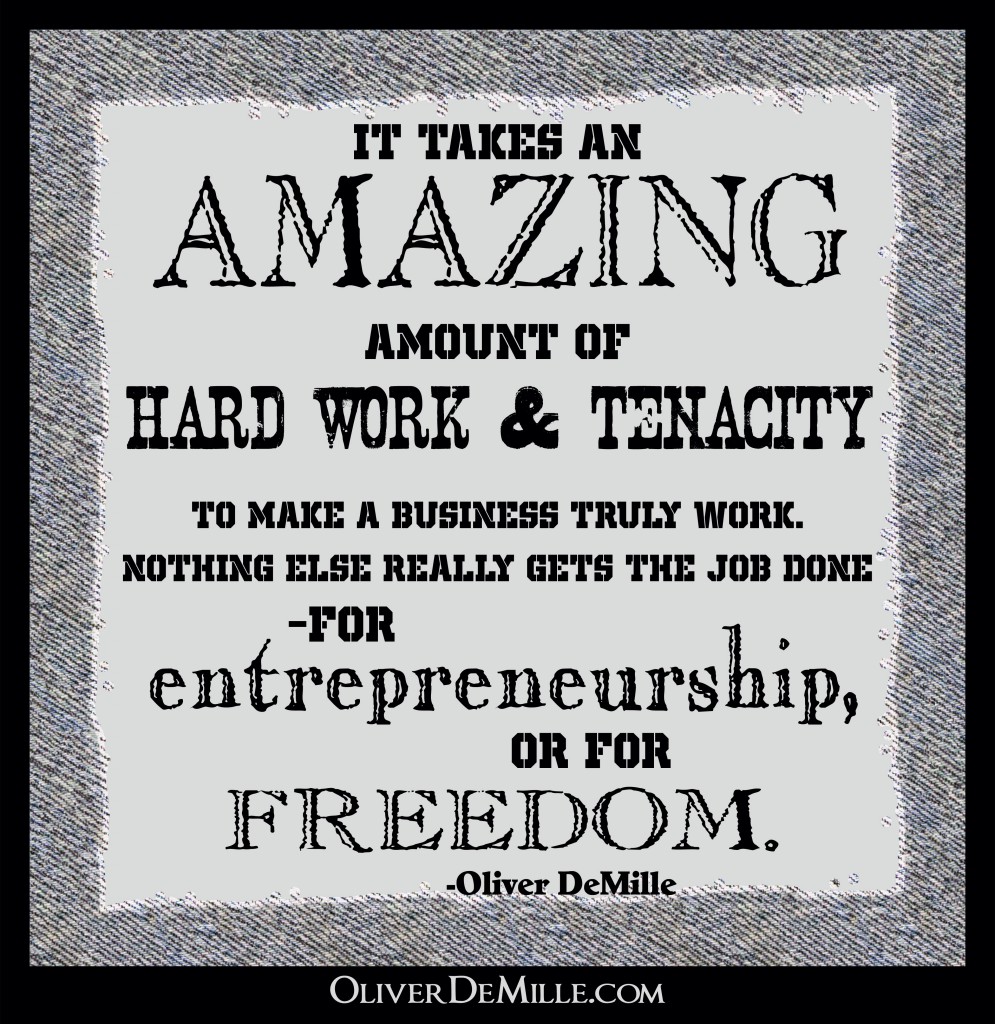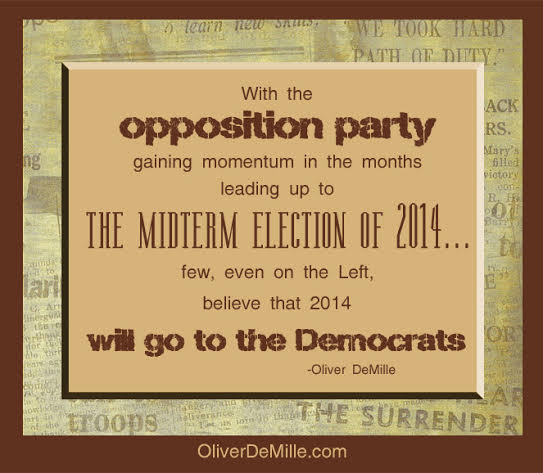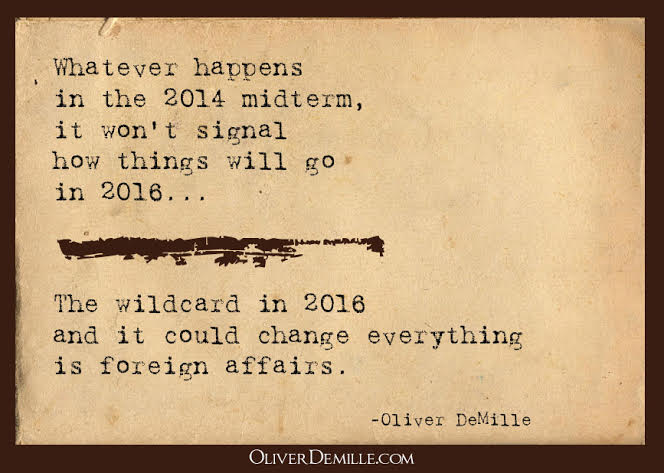SPECIAL REPORT Part II: Who I Want for President
September 15th, 2014 // 10:34 am @ Oliver DeMille
Diverging Paths
The good news is that the 2016 presidential election has the power to put America back on the right track.
The bad news is that same election could make things a whole lot worse for us.
If the United States votes for eight more years of a White House philosophy that believes in more big government, 2016 will be the year we officially endorsed the decline of America.
In a recent article I suggested that Rand Paul or Mitt Romney have a real chance in the next election. I received a lot of responses to this article—more than usual.
Some of them agreed, others showed support for these or different candidates (Jeb Bush, Marco Rubio, Rick Perry, Paul Ryan, Chris Christie, Mike Huckabee, etc.), and still others suggested that the Democratic party is our best hope.
In all this, nobody addressed my main point. It went something like this:
“Wouldn’t it be nice if we elected a president who actually believed in following the letter of the Constitution? How refreshing! What a great boost that would be for freedom—in the U.S. and around the world.”
Freedom President
I suggested that Rand Paul would likely be that kind of leader, and I’m convinced that Mike Huckabee, Mike Lee, and perhaps others would fit this mold.
Think about it! What a powerful concept: A president who reads the Constitution and simply follows it. Now that’s a truly great idea.
The problem is that presidents don’t do this anymore. Worse, the American people don’t even expect them to do it.
The truth is that most recent presidents would tell you they did follow the Constitution, but when they say this they’re talking about the Supreme Court’s definition of the Constitution. That’s not what I mean.
I’m referring to following the Constitution the way the American founders used the phrase: by reading what it says, and following it. Not by using Supreme Court rulings or Attorney General letters as excuses or grants of executive authority.
This is a really big deal. If we don’t read the document and just follow it,* we aren’t really benefiting from what the Constitution is all about.
And freedom will continue to decline.
Contrast Politics
For example, when President Obama announced major airstrikes against ISIS in Iraq and Syria, he made sure to point out that he had the authority to order such military operations without any vote from Congress.
He called this following the Constitution, but it isn’t. The document is very clear: only Congress can vote for long-term military operations.
The president can act to stop a direct, immediate threat to the U.S. homeland, but anything beyond that requires a decision by Congress.
In contrast to Obama’s words, when Rand Paul was asked if the president needed Congressional authority for his long-term military plan, he responded that yes, this is exactly what the Constitution says.
It was refreshing to hear a top potential presidential candidate refer to the authority of the Constitution instead of the interpretations of the Court.
Sadly, Americans aren’t accustomed to hearing such words. Politicians refer to past precedents, the War Powers Act, Supreme Court decisions, earlier Congressional approvals that could be interpreted to apply in the current situation, and other policies—and all these distract from the real point.
The framers wrote the Constitution so the regular people could read and tell—with no help from experts—when their government officials were following it and when they weren’t.
False Authority and Failing Checks
It has become commonplace for the White House to simply ignore the Constitution, to intervene when and where it chooses, without regard to the document, and to claim that the Court gave it such power or that Congress allowed it such powers.
But the Constitution doesn’t give the Court or Congress the authority to grant the executive any powers. The Court can check the Oval Office, as can Congress, but neither have the Constitutional power give the Executive additional authority.
The people, not the Court, are the final experts on the Constitution. Presidents routinely pay little heed to the Constitution because the people let them get away with it.
The people keep electing candidates who openly say the role of the president is to go beyond the Constitution—especially in foreign relations, but also in domestic policy. As long as we keep voting this way, we keep losing more freedom.
Recent presidents from both parties have egregiously ignored the Constitution. And among the current potential candidates for president, it is commonplace to speak of following the Constitution and mean the modern, Beltway view of the president’s powers—ignoring the actual words in the document itself.
That’s why I’m so impressed when I hear Rand Paul and Mike Huckabee talk in a totally different way. Or Mike Lee, though he’s shown no interest in the 2016 presidency.
Again, wouldn’t it be great to elect a president who doesn’t consult Washington insiders but rather the pages of the U.S. Constitution when an issue arises.
Imagine a president who would tell Congress that we need serious military action but he won’t take it without their approving vote.
That kind of leadership is sorely missing in America, and one of the top causes of our decline.
Keepers Above the Law
One root of the problem is that most Americans today don’t really believe in limits on government. For example, just watch how the police behave in almost every cop-oriented television drama and movie.
They frequently don’t wait for a warrant, they smash in doors of homes and apartments with guns waiving and SWAT units swarming. The good cops, the best officers in these shows, are the ones who push the law to its furthest limits and even break it when they deem it “necessary.”
The more they ignore or circumvent the Constitutional guidelines and get away with it, the better cops they are. Or so they are portrayed.
I’m not saying that the Hollywood version of police actions is always accurate in real life (though the increased militarization of law enforcement is a serious, growing threat to regular citizens).
I am saying that these TV dramas and movies are a very real portrayal of how most Americans believe the cops are and should be.
This is what our culture has come to consider good police work—finding ways to sneak around or get away with just ignoring Constitutional limits, protections, and due process.
Vice as Virtue
Most Americans won’t say it in so many words, but they are used to thinking of police officers as above the law in many—if not most—situations, and of expecting the good cops to bend the “annoying” Constitutional limits and just do whatever is needed to go get the bad guys.
And if this is how they see the police, consider how much more they admire this same bravado in the President.
Of course, both parties whine when a president from the other party exerts unconstitutional influence or executive orders to expand his power. But they frequently defend their own party’s president in the same, or worse, abuses.
It’s literally endemic in our modern system. It bears repeating until we realize what a major threat this is!
 The way our majority culture now sees it, the best cops and government leaders do whatever it takes, even bending or ignoring the Constitutional rules, to “do the right thing.”
The way our majority culture now sees it, the best cops and government leaders do whatever it takes, even bending or ignoring the Constitutional rules, to “do the right thing.”
Think of the most popular police dramas and movies—the main character(s) is always the “good guy” who breaks the Constitutional boundaries in service of the greater good.
NCIS, CSI, Blue Bloods, Hawaii Five-0, Law and Order, Chicago PD, Arrow, Bones, Castle, Criminal Minds, NCIS Los Angeles, Agents of SHIELD, Scandal, Covert Affairs, 24, The Blacklist, and many others, all follow this plotline.
These aren’t obscure programs; they are among the most popular in our era. One or more of them is almost always playing on American prime time, and our culture is inundated with their messages.
The Power of 2016
This is how we see government officials, and especially the government agents who carry guns or work in the Oval Office. Again, I’m not saying people openly support this view in polls; I’m saying it is now part of our gut-level cultural expectation.
A majority of Americans now think government agents can and even should routinely push and even break Constitutional limits.
Yes, some people watch cop shows or government dramas and think, “That’s terrible! How can our leaders consistently get away with just disregarding and even flouting the Constitution? They should be reprimanded and removed.” But such Americans are a small minority.
Most of the electorate considers such behavior by police and top executive officials as the norm, and as what is needed to get the job done.
When someone they personally know or identify with gets pushed around, they cry unfair. But when it’s just other people suffering at the hands of abusive government actions, most voters turn a blind eye.
Would I like something different, a president who reads the Constitution to see if he has the authority for a certain action and then realizes he doesn’t and chooses to stay within the bounds of that great document? You bet I would. The future of freedom depends on it.
The thing is, I think we actually have the power to elect such a leader in 2016. Watch what the potential candidates say. So far, Rand Paul and Mike Huckabee are excellent examples of leaders who talk a lot about following the Constitution and really stand for this approach. Regardless of political parties, that’s the kind of President we want.
* Of course, the people have made changes to it over time, including the Amendments and the end of slavery and reduction of racism (there is more work to be done on this). Note that these changes were made by the people, not the federal government, and following them is in keeping with the people overseeing their leaders and holding them to the Constitution.
 Oliver DeMille is the New York Times, Wall Street Journal and USA Today bestselling co-author of LeaderShift: A Call for Americans to Finally Stand Up and Lead, the co-founder of the Center for Social Leadership, and a co-creator of TJEd.
Oliver DeMille is the New York Times, Wall Street Journal and USA Today bestselling co-author of LeaderShift: A Call for Americans to Finally Stand Up and Lead, the co-founder of the Center for Social Leadership, and a co-creator of TJEd.
Among many other works, he is the author of A Thomas Jefferson Education: Teaching a Generation of Leaders for the 21st Century, The Coming Aristocracy, and FreedomShift: 3 Choices to Reclaim America’s Destiny.
Oliver is dedicated to promoting freedom through leadership education. He and his wife Rachel are raising their eight children in Cedar City, Utah
Category : Aristocracy &Blog &Citizenship &Community &Constitution &Culture &Current Events &Government &Information Age &Leadership &Liberty &Mission &Politics &Statesmanship
The “BIG” Problem by Oliver DeMille
July 30th, 2014 // 7:53 pm @ Oliver DeMille
The Wrong Size
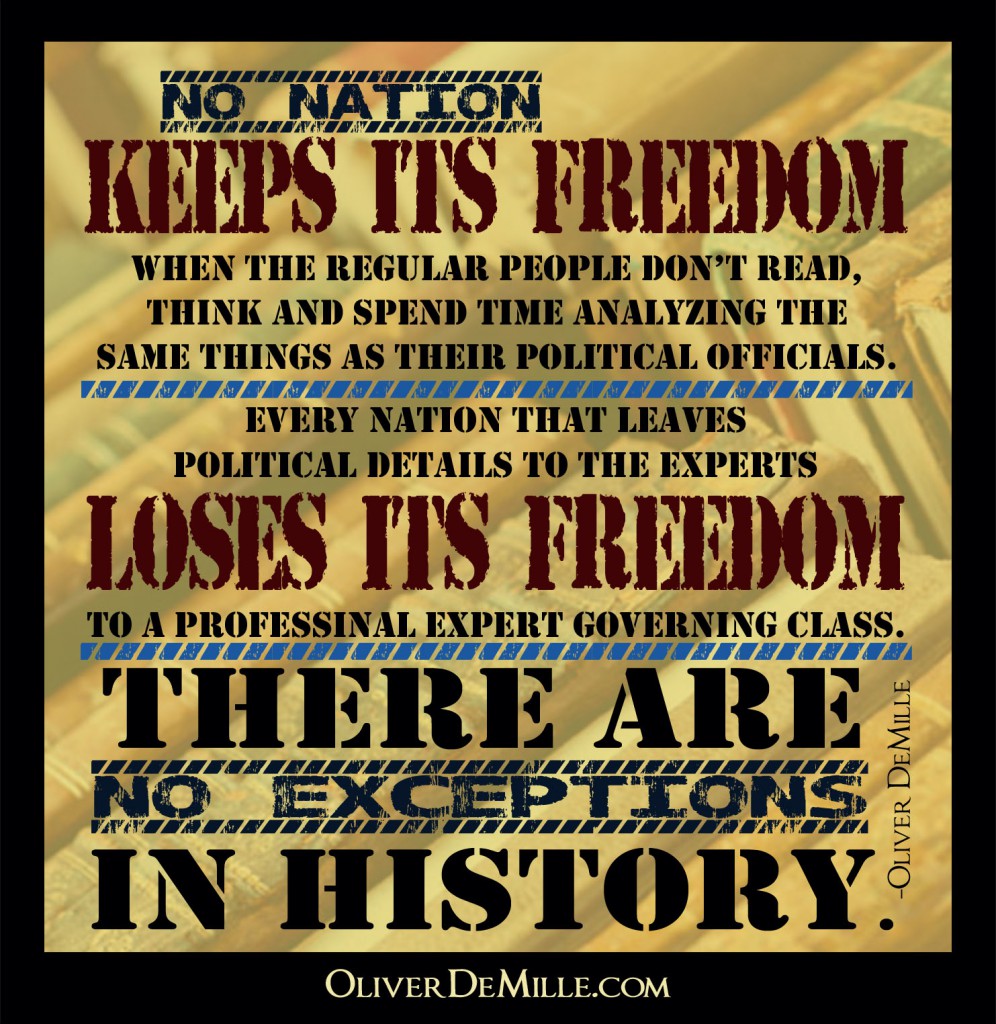
The “BIG” problem isn’t just hugely important, it’s also the incredible set of challenges that are created when any institution, organization, or endeavor is just plain too big. This problem is predictable, and therefore solvable, but only if the right people are keeping an eye on the right things.
Specifically, our modern government is too big. Period. Until this problem is remedied, we will continue to see crisis after crisis after crisis, each followed by infighting, gridlock, dysfunction, and major mistakes from Washington and both parties. As long as the government tries to do too much on too big a scale, it will continue to do many things poorly.
In fact, our government reached this turning point (too big to be efficient) in the late 1960s. As Micklethwait and Woolridge put it: “By the 1970s, the U.S. government seemed to be spoiling everything it touched…” (Foreign Affairs, vol. 93, no. 4, p. 126) And the size and scope of its endeavors have more than quadrupled since.
The Two Crises
This has created two overarching crises that never seem to dissipate. In fact, they’ll continue to fester and grow as long as the government grows. First, a government too big to be effective or efficient tends to infectiously weaken the effectiveness and efficiency of everything it touches—and at the same time it habitually tries to touch more and more. This dull, inevitable march to control more parts of life and the economy (and inadvertently make them all less effective) has killed every great world power in history.
Its occurrence in the United States is now the defining characteristic of our century—for the whole globe.
Second, the bigger the government gets once reaching this point of inefficiency, the less it fulfills its primary mission. For the framers, the role of what they called the “general government” (meaning the federal government, what we now usually call the “national government” or even, tellingly, “the government”), was national security and the protection of freedom.
The framers saw no other role for Washington. It’s raison de etre was to protect inalienable rights and defend the nation. Nothing else. In fact, the Constitution was designed specifically to ensure that it did nothing else. Worried that they hadn’t quite made this certain, the founding generation then added the Bill of Rights to make absolutely sure that the federal government only did these two things.
Then, just in case they hadn’t made it clear enough, they added the Ninth Amendment to the Bill of Rights. But even then they worried that they hadn’t done enough to limit the federal government. So they added the Tenth Amendment as well: “The powers not delegated to the United States by the Constitution, nor prohibited by it to the states, are reserved to the states respectively, or to the people.”
“We want the federal government to protect inalienable rights and maintain national security, and do nothing else!” they tried to say (the Constitution). Then, “And we mean it (the Bill of Rights). We really mean it (the Ninth Amendment). Seriously, we truly, totally, emphatically, mean it! (the Tenth Amendment).”
Richard A. Epstein wrote: “…the two central concerns of constitutional law” are “institutional structure and individual rights.” (Harvard Journal of Law and Public Policy, vol. 37, no. 3, p. 705) The purpose of institutional structure is to secure individual rights, not vice versa.
The People or the Government?
But when the focus of government becomes too big, well beyond the Constitutional powers of protecting rights and maintaining the national defense, the individual rights of the people become a resource to be bargained, traded or sacrificed in the name of institutional structure. “Think not what you can do for your country, but what your country can do with or without your consent for itself,” becomes the operating principle.
The people, the individuals, are forgotten in this new arrangement. They become a cypher, expendable, unimportant. Not citizens but voters. Not a nation of, by, and for the people, but now people for, by, and of the nation (meaning whatever Washington says). In other words, an aristocracy, where elites run the nation and control the people who live in it.
This isn’t the founding model of Americanism at all. It’s the opposite. It’s top-down government, not Jefferson’s bottom-up democracy. As such, it is fundamentally authoritarian, not a self-governing republic. This has created two natural results: national decline as the world’s sole superpower, and the decline of individual freedoms.
Both declines will continue as long as the “BIG” problem (the government is too big) persists.
The Cause
But what can be done, realistically? The federal government can be held to its Constitutional boundaries. It can be limited to national defense and the protection of the inalienable rights of its citizens. This is why the government was created in the first place, and when it tries to do anything else beyond these two roles it is both unconstitutional and also destructive to freedom, prosperity, and happiness.
The people still have the power to remedy this, in every election, if they’ll choose to vote wisely.
Note that nearly all nations in both the free and the authoritarian world are facing the “BIG” Problem. Following America’s lead, or in some cases simply striking out on their own, modern governments are drastically expanding—not sticking to their wise or constitutional limits. For example, the debt of governments around the world “…reached $50.6 trillion in 2013, compared with just $22 trillion in 2003.” (Ibid. p. 130)
At this rate, the fall of individual freedoms to the “BIG” Problem is all but ensured.
This trajectory isn’t surprising in the authoritarian nations, where elites openly rule the masses. But in the free nations, it is a relatively new development, one that began in the United States with the advent of the GI Bill after World War II. Before this time, education generally emphasized the classics and the great skills of deep reading (e.g. The Federalist), writing and thinking.
When the government began massively funding higher education, schools changed their emphasis to job and career training, and subsequent generations of Americans stopped learning to read. Of course, they gained literacy, but as a nation we lost our high level of what I’ve called Leadership Education and what E.D. Hirsch called Cultural Literacy—a deep understanding of the same things our leaders read and think about.
In fact, before 1945, the primary focus of American education was for each child, youth and citizen to read the same books and think about the same ideas and questions as their Presidents, Senators, Judges, and leading CEOs.
Allan Bloom called this momentous shift away from cultural literacy “the closing of the American mind,” and he warned that unless we reversed this trend democracy was doomed. We didn’t reverse it, and as a result, as mentioned above, “By the 1970s, the U.S. government seemed to be spoiling everything it touched…” (Op Cit)
In the 2010s, the dearth of leadership education is a wholesale national crisis. Very few people know how to really read the fine print of government any more. In such situations, rule by elites is the only historical norm.
If we are merely voters rather than engaged citizens, we vote poorly. We are swayed by media, photogenicism, and campaign popularity contests. We ignore the fact that candidates lie, or more accurately that once in office they routinely fail to live up to their campaign promises.
We become a nation of children, led around by our elite handlers, rather than a nation of adults who closely scan government actions and keep our politicians and their policies on a tight leash.
Again, the fundamental problem is that we aren’t in the habit of reading or thinking like leaders. For example, consider the following commentary from a contemporary source:
“Freedom of speech” in “freedom of speech, or of the press” means the freedom of all to speak; this suggests that “freedom…of the press” in the same phrase means the freedom of all to use the press. Reading “freedom” to mean “freedom of every person to engage in an activity” when “freedom” relates to “speech,” but reading the same word in the same place as meaning “the freedom of some particular group of people” when it relates to “the press” is not how users of the English language use these kinds of closely connected clauses…” (Harvard Journal of Law & Public Policy, vol. 37, no. 3, p. 733)
Most moderns don’t enjoy reading such paragraphs. They wonder what it is about, why it matters, and why they should read it at all. They have to dig to ascertain it’s meaning, and even then they feel a bit unsure. They consider it the kind of reading to be done by experts, not every citizen. Yet this is the argument a Supreme Court Justice used to make the case that everyone has the right to share their opinions openly—against some who argued that the only ones with this right are actually professional reporters and journalists.
This is a huge deal, with massive consequences to our freedom. Yet almost the only people who read such paragraphs are experts. In the founder’s time, the regular citizens read such ideas and discussed them at length. In our day, we don’t.
Then, when we go to the ballot box, we vote very differently than the founders or any other people who actually closely study and understand the fine print. No nation keeps its freedoms when the regular people don’t read, think, and spend time analyzing the same things as their political officials. Every nation that leaves political details to the experts loses its freedom to a professional expert governing class. There are no exceptions in history.
Yet today we are two nations: the masses, who focus on their careers (from kindergarten through retirement) and entertainments, and the elites who read the fine print and understand it—and use the education of their children to pass on these same skills and interests. This is aristocracy, pure and simple. Freedom and democracy cannot last in such a climate.
One more example, though there are thousands that could be used:
“…today we have about 5,000 federal criminal statutes on the books, most added in the last few decades [since the shift of the 1970s]. And the spigot keeps pouring, with hundreds of new statutory crimes inked every few years. Neither does that begin to count the thousands of additional regulatory crimes buried in the federal register. There are so many crimes cowled in the numbing fine print of those pages that scholars actually debate their number.” (Harvard Journal of Law & Public Policy, vol. 37, no. 3, p. 747.)
This is the “BIG” Problem in a nutshell. If people don’t know the law, how can they obey the law? If government becomes so big that only the experts know the law, we are living in an aristocracy. But when government becomes so big that even the experts don’t know the law, the nation itself is in danger. Everything the government touches weakens, and the government tries to touch everything. This is today’s America.
The Solution
The answer is to teach the current generation of youth how to read. Really read, in the Allan Bloom, culturally literate, Leadership Education way of reading. Such reading empowers the regular people to think about the same ideas the experts, government officials, and top leaders are thinking about. This creates a nation that is capable of a democratic republic, and of freedom.
No other education allows a citizenry to remain free.
This starts by teaching young people (and adults, where needed) to read the classics. Then to read the scholarly journals and other deep writings of experts and government officials. Without this skill, and this habit, freedom is always lost.
Ironically, most people reject this solution because it takes too long, and can compete with their kids’ career training. This is exactly the short-term viewpoint that is trained into the masses by conveyor-belt schooling. The elites, in contrast, make this a major priority. They ensure that their youth have a leadership education above all else. They know this is the key to their future power. Elite private schools train leadership through the classics.
People who don’t read the classics, the scholarly journals and writings, and important government documents, are part of the masses. Those who do are part of the ruling elites. The goal is to get the majority of citizens reading these things. Only then are the people the rulers, and only then is a nation free.
The “BIG” Problem can only be solved the LITTLE Solution: you reading the classics, journals and other deep writings, and government documents—a little each day. If you don’t do this, you will witness less freedom and the major decline of your nation, and even less freedom for your children and grandchildren.
 Oliver DeMille is the New York Times, Wall Street Journal and USA Today bestselling co-author of LeaderShift: A Call for Americans to Finally Stand Up and Lead, the co-founder of the Center for Social Leadership, and a co-creator of TJEd.
Oliver DeMille is the New York Times, Wall Street Journal and USA Today bestselling co-author of LeaderShift: A Call for Americans to Finally Stand Up and Lead, the co-founder of the Center for Social Leadership, and a co-creator of TJEd.
Among many other works, he is the author of A Thomas Jefferson Education: Teaching a Generation of Leaders for the 21st Century, The Coming Aristocracy, and FreedomShift: 3 Choices to Reclaim America’s Destiny.
Oliver is dedicated to promoting freedom through leadership education. He and his wife Rachel are raising their eight children in Cedar City, Utah
Category : Aristocracy &Blog &Business &Citizenship &Community &Constitution &Culture &Current Events &Economics &Entrepreneurship &Foreign Affairs &Generations &Government &Leadership &Liberty &Politics
A Missing Piece of Entrepreneurship
July 25th, 2014 // 7:38 am @ Oliver DeMille
What Some Entrepreneurs Are Missing
I write a lot about entrepreneurship, even though my main focus is freedom. The reason for this is simple: free nations are always nations with a strong entrepreneurial sector. There are no exceptions in history.
Put simply, the great free nations of human experience had a flourishing free enterprise. This was true in ancient Athens and ancient Israel, the Swiss free era and the Frank golden age, the free periods of the Saracens and also the Anglo-Saxons, the American founding era and the modern free nations of Britain, U.S., Canada, Japan and Europe, among others.
Take away free enterprise, and a nation’s freedom always declines. Shut down the entrepreneurial spirit, and liberty rapidly decreases.
The main reason freedom rises or falls with entrepreneurialism is simple: 1) to succeed as an entrepreneur, a person must exhibit the character traits of initiative, innovation, ingenuity, creativity, wise risk-taking, sacrifice, tenacity, frugality, resilience, and perseverance, and 2) these characteristics are precisely the things that through history have proven necessary for free citizens to stay free.
The Hidden Problem
The large majority of responses when I write about entrepreneurship are thoughtful, insightful, and even wise. But once in a while when I write an article pointing out the importance of free enterprise and entrepreneurship to freedom, I get a strange response. I call it “strange” because it shows that some people don’t quite understand what I mean by entrepreneurship. Such comments go something like this:
“I’m a born entrepreneur, and I’ve started dozens of businesses, so I understand that…”
“I have a list of ideas for successful entrepreneurial projects—could you suggest which of these might be the best options…”
“My spouse is constantly starting entrepreneurial ventures and using up our capital in such schemes, and your article made him want to do several more of them…”
These types of sentences are a real head-scratcher. Why? Because this isn’t what successful entrepreneurship and free enterprise is all about. Not at all.
Successful entrepreneurs typically start 2-4 businesses during their life, not dozens, and at least one of them becomes an important enterprise. The free market just doesn’t reward people who start dozens of businesses, frequently jumping around from business to business.
People who are constantly engaged in their latest “start-up” aren’t really following the entrepreneurial path. They’re just endlessly repeating the first part of it. Free enterprise rewards those who stick with a business until it becomes a real success, or who learn from the mistakes of the past and then stick with the next venture until it truly prospers.
A lot of successful entrepreneurs have had a failure or two, but not many of them have spent their years working on dozens of businesses. They soon learn to pick one and do what it takes to succeed. They buckle down and go through the process of turning their company into something.
In fact, many successful owners have suggested that it takes about 10,000 hours, or even more, to become good enough at a business or economic sector to make it profitable. Those who are constantly jumping around just can’t ever get there.
The Real Thing
When people talk about an entrepreneurial attitude or viewpoint of always starting another business, that’s one thing. But it’s not the same thing as tenaciously persevering until one business flourishes—and then tenaciously persevering as it keeps thriving.
This latter approach is the kind of entrepreneurship that builds a nation. It’s more than just a posture or a habit of starting a bunch of businesses. It’s more than liking the idea of business ownership. It’s more than talking about being your own boss.
It takes an amazing amount of hard work and tenacity to make a business truly work. Nothing else really gets the job done—for entrepreneurship, or for freedom.
This might seem like a little thing, like a meaningless play on words, but it isn’t. It is huge! Entrepreneurship doesn’t spur liberty in a society just because some people have an independent, “I’ll do it myself” or “I’d rather be my own boss” attitude. That’s part of it, but there’s more.
Free enterprise is great when the enterprises work. This happens only when the small business owner pays the price to become a successful leader and make the enterprise blossom and grow.
Again, this might not always occur—and it never comes easily—but the leaders who build a free nation are those who hunker down and do the hard work to make it happen. Even if they fail, they make it happen the next time. One dedicated day at a time. Through all the hard times and challenges. Even when everyone else would have given up.
A nation with a lot of such entrepreneurs has a real chance at freedom.
A nation without them never does.
 Oliver DeMille is the New York Times, Wall Street Journal and USA Today bestselling co-author of LeaderShift: A Call for Americans to Finally Stand Up and Lead, the co-founder of the Center for Social Leadership, and a co-creator of TJEd.
Oliver DeMille is the New York Times, Wall Street Journal and USA Today bestselling co-author of LeaderShift: A Call for Americans to Finally Stand Up and Lead, the co-founder of the Center for Social Leadership, and a co-creator of TJEd.
Among many other works, he is the author of A Thomas Jefferson Education: Teaching a Generation of Leaders for the 21st Century, The Coming Aristocracy, and FreedomShift: 3 Choices to Reclaim America’s Destiny.
Oliver is dedicated to promoting freedom through leadership education. He and his wife Rachel are raising their eight children in Cedar City, Utah
Category : Blog &Business &Citizenship &Community &Culture &Current Events &Economics &Entrepreneurship &Leadership &Liberty &Mini-Factories &Producers &Prosperity
A Huge Surprise! by Oliver DeMille
July 21st, 2014 // 6:09 am @ Sara DeMille
My Eureka Moment
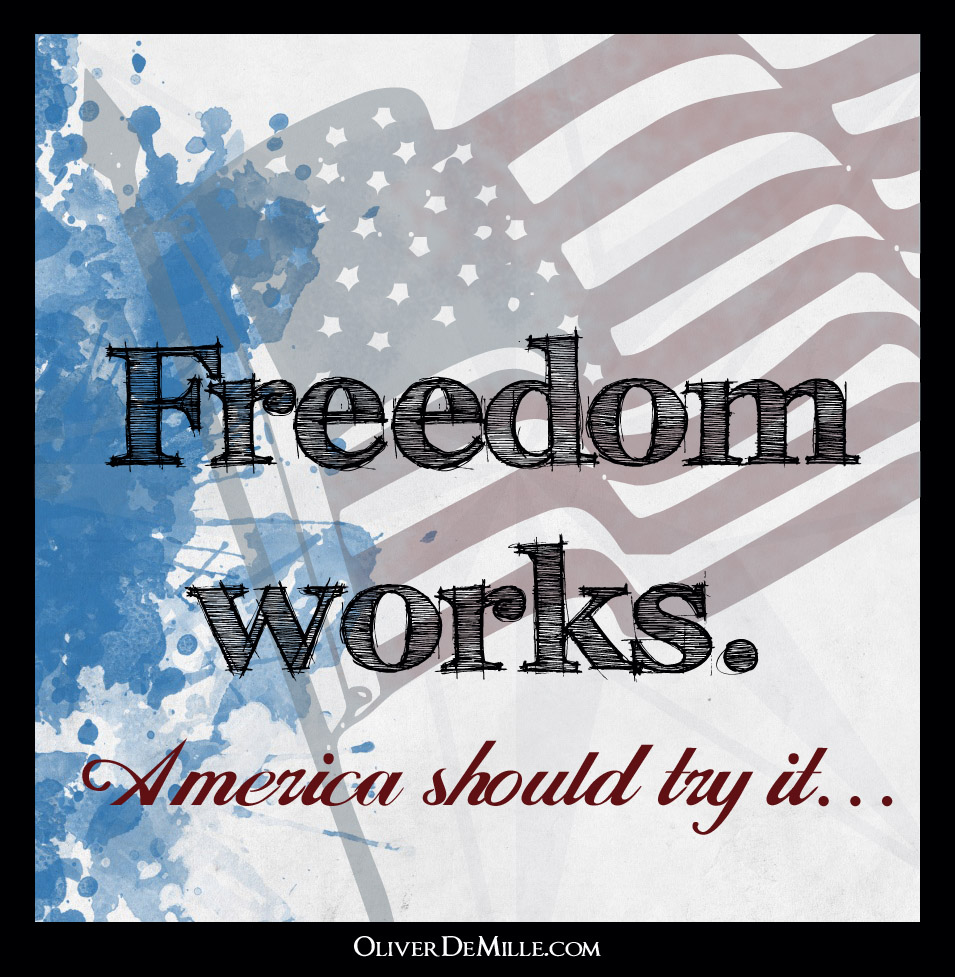 It was downright amazing! Surprising, in fact. Shocking. Actually, I don’t think the American founding generation would have been surprised at all. They would have expected it. But for me, raised in our modern world, it was a true Eureka!
It was downright amazing! Surprising, in fact. Shocking. Actually, I don’t think the American founding generation would have been surprised at all. They would have expected it. But for me, raised in our modern world, it was a true Eureka!
I should have seen it coming, to tell the truth. In fact, if someone had asked me beforehand to predict what would happen, I’d have put on my forecasting cap and I…probably still wouldn’t have known. But nobody asked, and I didn’t give it a thought. I guess I’m getting ahead of the story, though, so let’s back up a bit.
Petitions and Amazing Happenings
Last summer and fall a number of people in our small town went around getting citizens to sign a petition. The city had decided to raise taxes to meet the growing demands, and some people thought this was a bad idea. The truth is, the leaders in our town are very dedicated and honest—the ones I know personally, which includes most of them, are people of deep integrity.
The same is true of the citizens who talked to me about signing the petition. I studied the issue and decided that, in my opinion, we really didn’t need the additional services the tax increase would cover. I signed the petition.
So did a lot of people, and the taxes were postponed—at least for a while.
Then came the annual 4th of July celebration. Of course, one of the great traditions of Independence Day is watching the fireworks. This was suggested by founding father John Adams, and it has been a ritual of growing up for most Americans ever since.
But fireworks were one of the things cut by postponing the tax increase. As the 4th approached, this became a topic of discussion across back fences, near mailboxes, and anywhere else neighbors met. “I voted against raising taxes,” one neighbor told me, “but I’ll sure miss the fireworks.” He shook his head sadly.
I found myself agreeing with him. I repeated his sentiment several times during the last half of June.
Time passed, as it always does, and the holiday arrived. There was a parade, snow cones, barbecues and races. When evening came, my kids asked if I wanted to drive to the neighboring town and watch the fireworks. I told them to go ahead. On the one hand I felt a bit like a hypocrite for voting against the taxes and then driving to the next town for their tax-funded fireworks. But mostly I was just worn out from the day and wanted to stay home. “If only we could just sit in our yard and watch the fireworks like every year,” I heard my voice saying in spite of myself.
The kids left, and Rachel and I sat in the yard and watched dusk turn into darkness.
Then an amazing thing happened. Our neighbors just down the road begin shooting off amazing fireworks. Because the city wasn’t providing fireworks, policies were relaxed and people were allowed to fire up the kind of fireworks usually only done by the local government.
Firework Economy
We watched in awe. Because our home is on a hill, the bursts seemed close enough to reach out and touch.
But that was just the beginning. Right after the neighbors began their display, another one started just down the road. Then another, and another. We walked the stairs to our balcony and looked out over the valley. Every neighborhood seemed to have the kind of fireworks that in past years have only been done by the city. We counted seventeen distinct places that shot off huge firework displays.
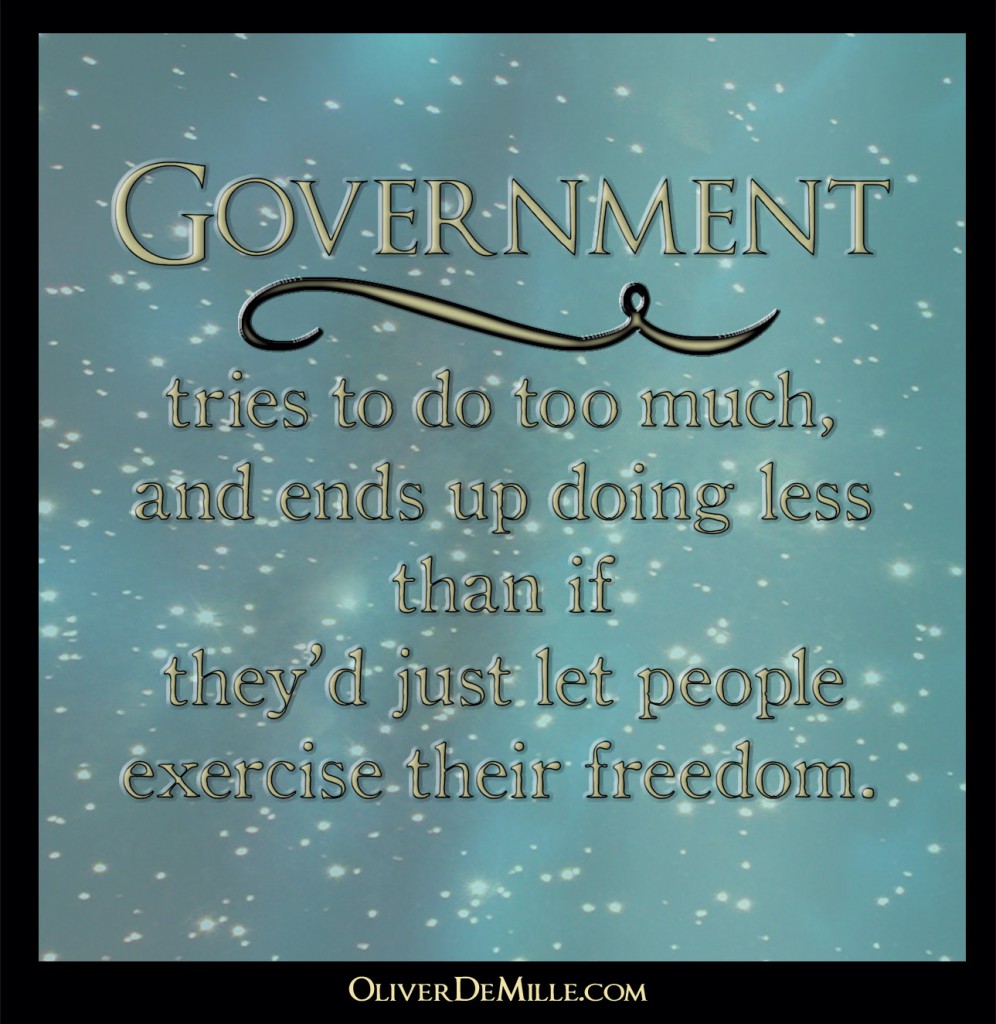 We watched them simultaneously. This went on for over two hours. The city’s usual annual display seemed to last about a half hour or so—I have no idea the actual timing, just my recollection. This one went on and on. An hour into this, three more neighborhoods started. Some ended, and new ones began.
We watched them simultaneously. This went on for over two hours. The city’s usual annual display seemed to last about a half hour or so—I have no idea the actual timing, just my recollection. This one went on and on. An hour into this, three more neighborhoods started. Some ended, and new ones began.
We watched in awe.
It was by far the most amazing fireworks display I’ve ever witnessed. All provided by private citizens. As far as I know, all paid for without tax funds.
As we watched, and as it continued well into the night, I turned to Rachel and said, “I can’t believe it! The city government never did anything close to this! Look at what the people are doing, all by themselves.”
She nodded. “Government tries to do too much,” she said, “and ends up doing less than if they’d just let people exercise their freedom.”
“Can you imagine what would happen to our economy if the government would get out of the way and let free enterprise work?” I asked.
“Instead of standing on a balcony watching the best fireworks ever,” she replied, “we could stand back and watch the nation’s economy boom and blossom. There would be jobs, progress and more prosperity everywhere!”
The One Thing That Works
We sat and watched in silence for a long time. The explosions boomed against each other and echoed through the valley. Sometime close to midnight things died down, and shortly after that our kids came home. They piled out of the van laughing and talking.
“Did you see all that?” our twenty-year-old asked enthusiastically. “That was the best fireworks display ever!”
“We didn’t even leave town!” our seventeen-year-old said. “We started to go, but then all these places started shooting up fireworks. They were everywhere! In every direction…”
“So we just pulled over at the park and got out to watch them!” our fourteen-year-old interrupted. “It was so amazing!”
I looked at Rachel. “Someday the government will get out of the economy and tell the people they’re on their own…and then we’ll see what freedom can really do in America.”
“That’s what you’re here talking about?” asked our twenty-two-year-old daughter with a big smile, baby in arms.
We laughed. “Well, it is the 4th of July” I said. “Isn’t this is exactly what every American should be talking about today?”
Long after the 5th of July arrived I rested on my bed, eyes open, unable to sleep. One thought just kept coming back to me, over and over.
Freedom works.
Today’s America should give it more of a try. Deregulate and let free enterprise shine and flourish. Most people today probably can’t even imagine it, but I bet it’s amazing what the people of this nation would rise up and do if given the chance.
Freedom works.
America should try it…
 Oliver DeMille is the New York Times, Wall Street Journal and USA Today bestselling co-author of LeaderShift: A Call for Americans to Finally Stand Up and Lead, the co-founder of the Center for Social Leadership, and a co-creator of TJEd.
Oliver DeMille is the New York Times, Wall Street Journal and USA Today bestselling co-author of LeaderShift: A Call for Americans to Finally Stand Up and Lead, the co-founder of the Center for Social Leadership, and a co-creator of TJEd.
Among many other works, he is the author of A Thomas Jefferson Education: Teaching a Generation of Leaders for the 21st Century, The Coming Aristocracy, and FreedomShift: 3 Choices to Reclaim America’s Destiny.
Oliver is dedicated to promoting freedom through leadership education. He and his wife Rachel are raising their eight children in Cedar City, Utah
Category : Blog &Citizenship &Community &Current Events &Economics &Entrepreneurship &Government &Leadership &Liberty &Politics &Prosperity
The Achilles of 2016 by Oliver DeMille
July 16th, 2014 // 9:08 am @ Oliver DeMille
Setting the Stage
When Barack Obama was elected in 2008, Republicans went into retreat. Pundits wondered if they’d ever recover, especially after the reversals they’d already experienced in the election of 2006. Some spoke in lasting terms, suggesting that Republicans had become a regional party at best.
Then came the historic Republican victory of 2010, a midterm election that put the GOP in charge of the House and gave it major gains in the Senate. It seemed that a reversal had come at last. A number of conservatives predicted continued victories in the 2012 election and projected that President Obama’s days in the White House were numbered.
With the opposition party gaining momentum in the months leading up to the midterm election of 2014, a number of politicos are forecasting another Republican sweep—some on a major scale that wins control of the entire Congress, others of a smaller but still respectable victory Few, even on the Left, believe that 2014 will go to the Democrats.
In this environment, some on the Right are vocally enthusiastic about the 2016 Presidential election. One elected official said he now thinks Mitt Romney will run again and win, and he has been widely quoted by a number of conservatives hoping for a major change in the White House.
The Common Wisdom
Thoughts about the 2016 election seem to split by geography. Talk to people in most red states, and they’re sure Romney or some other Republican will win this time. In blue states, the opposite is true, and Hillary Clinton is extremely popular. The mainstream media overwhelmingly leans in the direction of “Hillary is the clear front runner,” and most of the alternative (largely conservative) media is hesitant to pick a winner this early—meaning it too thinks Hillary has a lead.
The common wisdom now seems to agree on several things:
- Republicans will likely post some gains in the midterm election in November, but whether these are large or small it won’t have a huge impact on federal policy. The White House will block any drastic changes, and maintain its current agenda, albeit stifled a bit. Voters aren’t likely to see any real change of direction.
- Whatever happens in the 2014 midterm, it won’t signal how things will go in 2016. The 2006 and 2008 elections went in the same direction, but the 2008 and 2010 elections went down totally different tracks. We won’t know what’s going to happen in 2016 until it does.
- Hillary Clinton is definitely ahead right now, and 2016 is her election to lose. All indications are that, regardless of who the Republican nominee is, the strongly blue and red states will vote as expected, and the election will come down to the votes of Hispanics, women, and independents in a few swing states. Hillary will win big with the first two, and probably post a less spectacular win with the third as well.
The Unrest
The wildcard in 2016—and it could change everything—is foreign affairs. On the surface, this should be a strength for Hillary, who traveled widely as the First Lady and both shaped policy and set travel records as Secretary of State. But something deeper is at play. If world events continue to heat up, it could weaken Mrs. Clinton.
Many Americans see Putin’s antics and Syria thumbing its nose at the United States as direct failures of the Obama Administration, not to mention the growing sense that China is replacing us as the up and coming power in the world. Many Americans see Clinton’s role as Secretary of State as partly responsible for these very problems—or for not more effectively addressing them.
Watching rockets rain down on Israel is the worst possible optic for the future of the Democratic Party. (Of course, this is a much bigger issue than American politics, but it matters deeply how America uses its influence in such situations.) If the international incidents continue, or repeat or escalate at any point close to the 2016 election, many voters (most importantly the swing voters) will increasingly see Democratic leadership as weak, naïve and misguided, and yearn for a “strong” Republican-style leader who brings America back to its rightful place in the world.
If Benjamin Netanyahu were running for president in such an environment, it might be a Reaganesque sweep. It would have been fertile ground for Chris Christie, but Bridgegate may have put an end to his viability as the nominee. International unrest could easily increase support for iconic Republican leaders like Mitt Romney, Jeb Bush, et al. Romney may well consider another run on such grounds.
In fact, the current level of international unrest could have a huge influence on which Republicans (and even Democrats) ultimately run and who wins. Rand Paul is very popular among Republicans, for example, except when he starts talking about national security in what many of his base consider isolationist terms. And Christie might look better to voters in the face of a serious international threat.
The Outcome
In the famous Nixon-Kennedy presidential debate, the large majority of those who listened on the radio thought Nixon had won. Those who watched on television, however, thought Kennedy had the clear upper hand. He looked cool, calm, and excited about the future of America, while Nixon looked driven and frustrated. Obviously, Kennedy won the election.
The 2016 election will likely provide similarly interesting optics. How will Hillary and her opponent look on camera, compared to each other? This may be the true swing-point of the election.
But there is another possibility. What if the picture foremost in American minds at the time of the debates and election day includes a major national security issue? If China becomes more aggressive, or rockets are raining down on Israel, or anything similar, a Republican “tear down this wall” moment might sway the whole thing.
In our current world, this is not just possible but very possible. A candidate can’t count on it, but a front runner can’t be sure it won’t happen either.
 Oliver DeMille is the New York Times, Wall Street Journal and USA Today bestselling co-author of LeaderShift: A Call for Americans to Finally Stand Up and Lead, the co-founder of the Center for Social Leadership, and a co-creator of TJEd.
Oliver DeMille is the New York Times, Wall Street Journal and USA Today bestselling co-author of LeaderShift: A Call for Americans to Finally Stand Up and Lead, the co-founder of the Center for Social Leadership, and a co-creator of TJEd.
Among many other works, he is the author of A Thomas Jefferson Education: Teaching a Generation of Leaders for the 21st Century, The Coming Aristocracy, and FreedomShift: 3 Choices to Reclaim America’s Destiny.
Oliver is dedicated to promoting freedom through leadership education. He and his wife Rachel are raising their eight children in Cedar City, Utah
Category : Blog &Citizenship &Community &Culture &Current Events &Government &Leadership &Liberty &Politics

